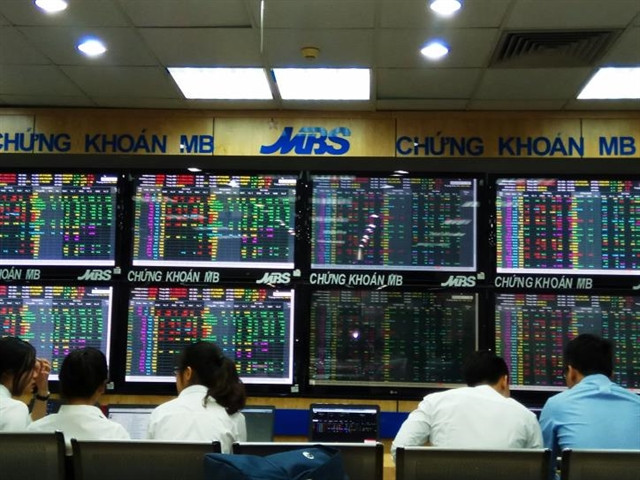Currently, the Big4 state-owned banks - Vietcombank, Vietinbank, Agribank and BIDV - continue to serve as effective extensions of state regulators in guiding the financial market and implementing monetary policies.
However, the securities subsidiaries of these Big4 banks remain relatively unremarkable, leaving limited impact on the market.
Among the top 10 securities brokerage firms by market share in the third quarter, as per the list published by the Hồ Chí Minh Stock Exchange (HoSE), familiar names like VPS Securities, SSI Securities Corporation, Hồ Chí Minh City Securities Corporation and VietCap led the rankings.
Despite a slight decline in market share, long-standing players such as VNDirect Securities Corporation and MB Securities retained their top ten status, while new entrants like Techcombank Securities and especially VPS have energised the brokerage market, intensifying competition.
Notably absent from this list are state-owned entities like Vietcombank Securities Company (VCBS) , BIDV Securities (BSC), Vietinbank Securities (CTS) and Agribank Securities Corporation (Agriseco), which are backed by Vietcombank, BIDV, Vietinbank and Agribank, respectively.
This discrepancy raises questions within the investment community, especially since the Big4 banks, as primary stakeholders, continue to hold leading positions in the banking industry.
 |
| VPS leads in brokerage market share. — Photo courtesy of Ly Ly Cao |
Backed by parent banks
State-owned securities companies were established long before most private securities firms in Việt Nam. They received comprehensive support from their parent banks, which are key players in the Vietnamese financial system.
For instance, BSC, founded in 1999, was among the first two securities companies in Việt Nam and the first one linked to a bank.
CTS and Agriseco were established in Hà Nội in 2000 by their parent banks. Although VCBS joined later in 2002, nearly two years after the Hồ Chí Minh Stock Exchange was officially launched, it was founded by a decision from Vietcombank’s board of directors.
These state-owned securities companies benefitted from their parent banks’ brand reputation, extensive business networks, high-quality human resources and abundant financial resources.
Additionally, their sales and service networks, present nationwide and continuously expanded since inception, provided a strategic advantage.
Underperformance
Despite their early market entry and competitive advantages, the growth of these securities subsidiaries has not matched the accomplishments of their parent banks.
The Big4 banks have continued to succeed in shaping the banking sector and have driven growth in pillar stocks with steady double-digit growth rates. In contrast, their securities subsidiaries have struggled to keep up with the broader securities industry.
These firms have not managed to break into the top ten in brokerage market share.
Their capital bases, essential for growth, remain modest at approximately VNĐ4.3 trillion (BSC) (US$169.3 million), VNĐ2.5 trillion (VCBS), VNĐ2.16 trillion (Agriseco), and less than VNĐ1.5 trillion (CTS).
In comparison, private firms like SSI (nearly VNĐ20 trillion), Saigon - Hanoi Securities (VNĐ 17.1 trillion) and VIX Securities (nearly VNĐ15 trillion) far exceed these capital levels, sometimes surpassing the combined capital of the four state-owned firms.
The state-owned securities firms have largely stayed out of the industry’s intense capital race, which aims to prepare for Việt Nam’s potential upgrade to emerging market status. Such an upgrade will require sufficient capital buffers and financial strength, especially for key growth areas like margin lending and proprietary trading.
Reflecting their modest capital bases, CTS and Agriseco report quarterly net profits of only a few dozen billions đồng, while VCBS and BSC perform slightly better with quarterly profits of around VNĐ100 - 150 billion, about 10 - 20 per cent of the profit levels achieved by leading private securities companies like SSI, TCBS, VPS and VNDirect.
 |
| Investors monitor market movements on a trading floor of a company. — VNA/VNS Photo |
Signs of transformation
In anticipation of a possible inflow of capital from an emerging market upgrade, some state-owned securities firms are starting to begin transformations.
BSC, for example, has been actively expanding its growth potential and quality. At the end of 2022, Hana Securities became BSC's second-largest shareholder, acquiring a 35 per cent stake. This capital injection raised BSC’s charter capital from VNĐ1.22 trillion to VNĐ1.88 trillion, providing nearly VNĐ2.7 trillion to fund business activities.
Beyond capital, BSC and Hana are launching new projects, including digital transformation initiatives and IT infrastructure upgrades, like the KRX trading system (a Korean technology advantage) and expanding their domestic and international client network.
Early last year, BSC partnered with Edmond de Rothschild, part of the Rothschild family’s financial ecosystem, to establish a fund management company in Việt Nam.
This joint venture aims to develop optimal investment products for Vietnamese investors, leveraging the combined expertise of BIDV, Edmond de Rothschild, Hana Securities and BSC. This collaboration is a stepping stone for BSC in its ambition to become Việt Nam’s first fully-fledged investment bank.
CTS has also made steady strides in recent years, showing consistent growth in proprietary trading and margin lending by five to ten per cent each quarter. This firm has expanded its listed stock portfolio to more than VNĐ1 trillion, marking a record within its peer group. — VNS